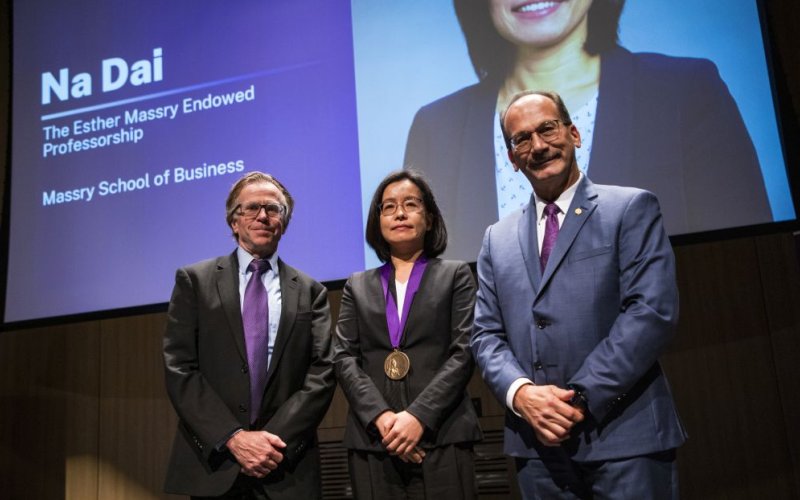5 Questions with Esther Massry Endowed Professor of Finance Na Dai

ALBANY, N.Y. (June 5, 2024) — In the mid-1990s, China’s financial market was in its infancy, and its entrance into the free market was viewed with a mixture of excitement, uncertainty and chaos. Na Dai was growing up in a coastal city 100 miles south of Shanghai as the transition was in full swing. Intrigued, she enrolled at Renmin University in Beijing to learn all she could.
“The Shanghai Stock Exchange and Shenzhen Stock Exchange had been open just five years before I went to college,” Dai recalls.
After earning undergraduate and graduate accounting degrees at Renmin, she went on to earn a PhD in finance at the University at Kansas. She joined UAlbany’s School of Business faculty in 2009, specializing in alternative investments.
In 2022, the U.S. Department of State named her a Fulbright Distinguished Scholar, assigning her to the University of Naples for the academic year to share expertise in corporate finance, entrepreneurship and innovation. Dai’s teaching and scholarship were recognized again this past October, when she was named the Esther Massry Professor of Finance.
Dai is a global expert on alternative investments whose research appears in the Journal of International Business Studies and other prestigious publications. Here, she shares her cross-cultural perspective, approach to teaching — and to cooking.
What questions in your field excite you the most?
A lot of innovations are happening in the financial industry, driven by new technologies, such as blockchain and artificial intelligence. They are already changing our daily lives (e.g., digital wallets, Robo advisors, crypto,) and have the potential to reshape the landscape of the financial industry (e.g., tokenization of real world assets, CBDCs, and DeFi).
I am very excited about the rapid development and strongly believe that our students should be exposed to them, as they will be working in a very different financial industry down the road. In spring, I offered a new course on Financial Technologies and Regulation. We navigated the development of financial technologies over the last 20 years. We discussed how financial technologies address some of the pain points of our traditional system and potential risks they bring. We debated whether Bitcoin is money, whether certain cryptos are securities and thus should be registered with the SEC. We did a deep dive on the FTX case and analyzed the economic reasons for its failure. Based on students’ responses, they are quite interested in these topics.
You were educated in China and Kansas, and taught in New Mexico, Albany and Italy. How does having a global perspective influence your research?
I actually also taught in Brazil! I have always had a strong interest in cultural differences. The older I get, the more I realize the deep influence of culture at both individual and national levels.
A lot of things that cannot be explained by rationality can be explained by culture. I did three papers on national culture and its influence on cross-border venture capital investment and hedge fund return and risk. My conclusion is that finance professionals, their investment strategies and risk-taking attitude, are very much culture dependent. For instance, in countries that emphasize individualism (e.g., the U.S.), hedge fund managers take on more risks in comparison to their peers in cultures that emphasize collectivism (e.g., Japan).
Your expertise is in alternative investing. Why is it important to understand venture capital, private equity and hedge funds?
Finance is the blood of any business. Alternative investments provide other funding opportunities for businesses. Understanding how they are different from traditional equity and bond and their return and risk profiles allows businesses to have more options to choose from when in need of capital.
For instance, venture capital is critical for the development and success of young high-growth businesses as it brings additional values on top of funding. But it has strings attached.
You are known as a case teacher. What’s a case you presented recently?
In the course I mentioned above, I used more than 10 cases, including the FTX case, since there is no textbook available for the topic. I typically provide a list of questions for the students to think about when I assign the case.
Based on how students participate in discussions, I can tell some read the case very carefully and had thought about the study questions. Those students really benefit from case discussions.
What do you most like to do in your free time?
I enjoy reading, painting, hiking, swimming and yoga. I am pretty good at cooking. (At least my family thinks so!) I experiment with recipes from all over the world. My recent experiment is a Jamaican roasted chicken. It is so juicy and smells so good.




